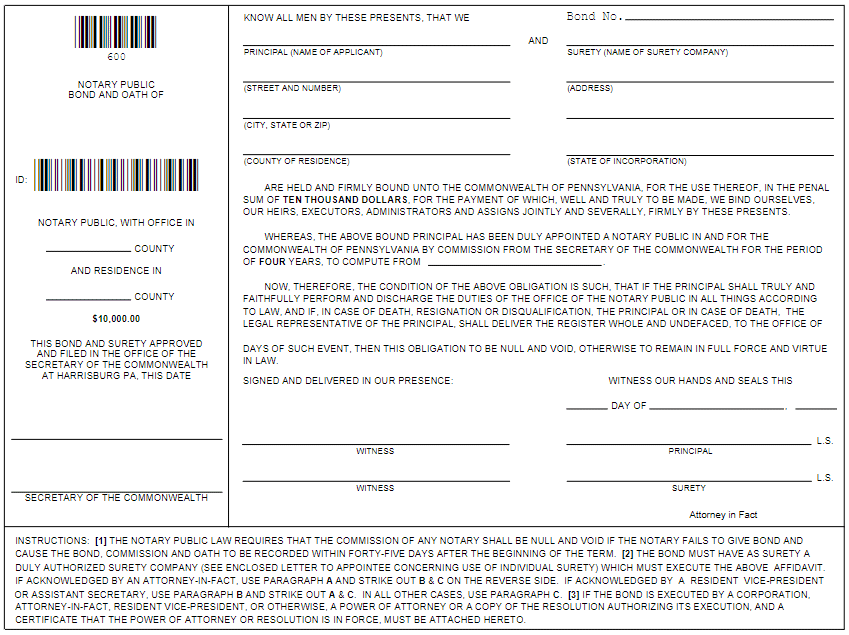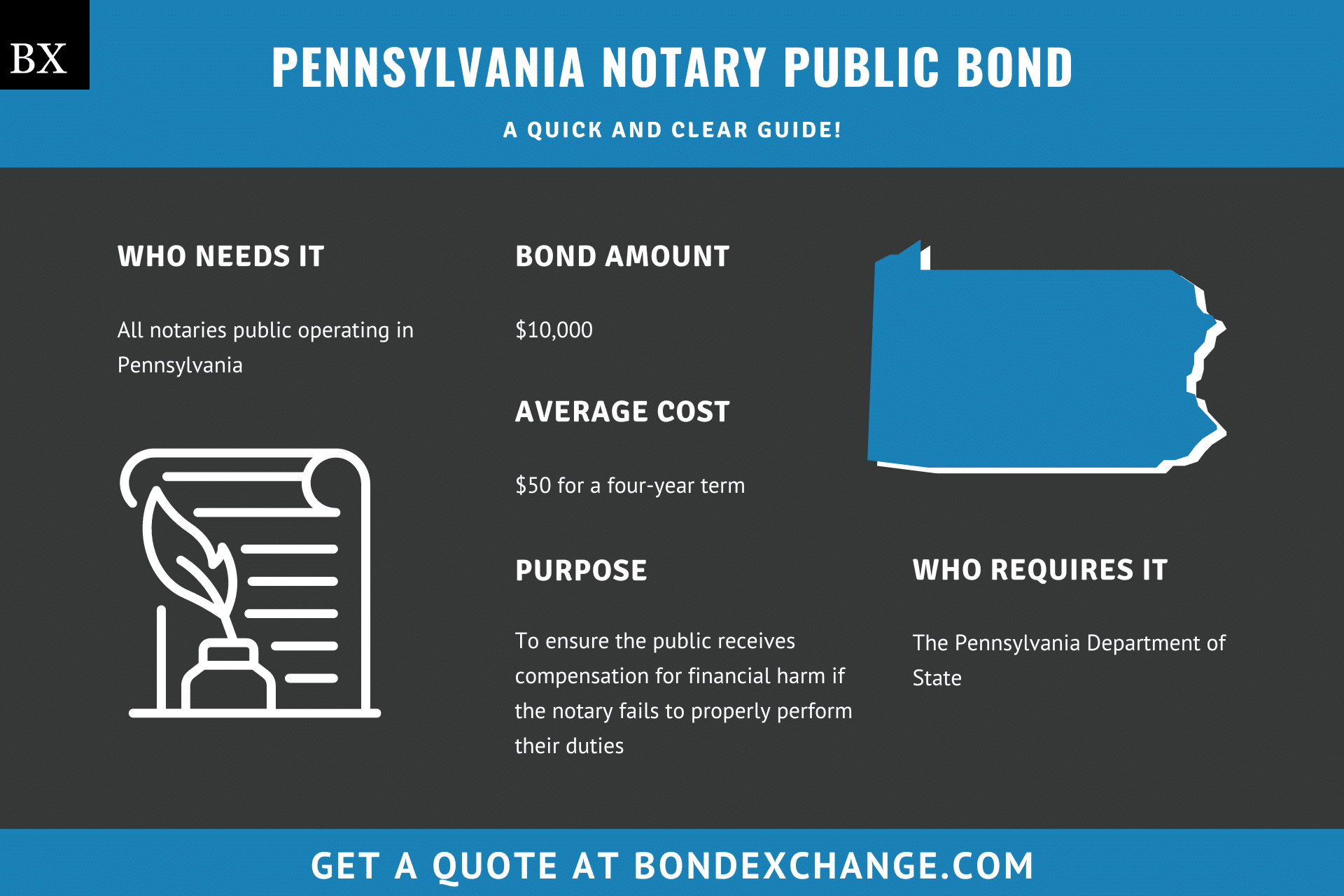Pennsylvania Notary Public Bond: A Comprehensive Guide
This guide provides information for insurance agents to help their customers obtain a Pennsylvania Notary Public bond.
At a Glance:
- Average Cost: $50 for a four-year term
- Bond Amount: $10,000
- Who Needs it: All notaries public operating in Pennsylvania
- Purpose: To ensure the public receives compensation for financial harm if the notary fails to properly perform their duties
- Who Regulates Notaries Public in Pennsylvania: The Pennsylvania Department of State

Background
Pennsylvania Statute 57-321 requires all notaries operating in the state to obtain a commission from the Department of State before providing notarial services. The Pennsylvania legislature enacted this requirement to ensure that notaries engage in ethical business practices. To provide financial security for the enforcement of the commission requirement, notaries must purchase and maintain a $10,000 surety bond to be eligible for a commission.
What is the Purpose of the Pennsylvania Notary Public Bond?
Pennsylvania requires notaries to purchase a surety bond as a prerequisite to obtaining a notary commission. The bond protects the public from financial harm if the notary fails to comply with the regulations outlined in Pennsylvania Statute 57-321. Specifically, the bond protects the public if the notary signs any documents for persons committing fraud or does not actually witness the signatures on documents being notarized. In short, the bond is a type of insurance that protects the public if the notary violates the terms of their commission.
How Can an Insurance Agent Obtain a Pennsylvania Notary Public Surety Bond?
BondExchange makes obtaining a Pennsylvania Notary Public bond easy. Simply log in to your account and use our keyword search to find the “Notary” bond in our database. Don’t have a login? Gain access now and let us help you satisfy your customers’ needs. Our friendly underwriting staff is available by phone at (800) 438-1162, email, or chat from 7:30 AM to 7:00 PM EST to assist you.
At BondExchange, our 40 years of experience, leading technology, and access to markets ensures that we have the knowledge and resources to provide your clients with fast and friendly service whether obtaining quotes or issuing bonds.
Not an agent? Then let us pair you with one!
Click the above image to find a BX Agent near you
Is a Credit Check Required for the Pennsylvania Notary Public Bond?
No, a credit check is not required for the Pennsylvania Notary Public bond. Because the bond is considered relatively low risk, the same low rate is offered to all notaries in the state regardless of their credit history.
How Much Does the Pennsylvania Notary Public Bond Cost?
The Pennsylvania Notary Public bond costs just $50 for a four-year term.
Who is Required to Purchase the Pennsylvania Notary Bond?
Pennsylvania requires notaries to purchase a surety bond as a prerequisite to obtaining a notary commission. To paraphrase Pennsylvania Statute 57.302, a notary public is a public official authorized to provide the following services:
- Take acknowledgments
- Administer oaths and affirmations
- Take verifications on oath or affirmation
- Witness or attest to a signature
- Certify or attest a copy
- Note a protest of a negotiable instrument
An electronic notary is a notarial officer approved by the Department of State to provide notarial services on electronic documents while physically present with the signer. Likewise, a remote online notary is a notarial officer approved by the Department of State to provide notarial services where the signer physically appears before the notary using audio-visual electronic communication technology. Notaries who wish to perform electronic notarizations or remote online notarizations do not need to purchase an additional surety bond.

How Do Notaries Apply for a Commission in Pennsylvania?
Notaries public in Pennsylvania must navigate several steps to obtain a commission. Below are the general guidelines, but applicants should refer to the Department of State’s website for details on the process.
Commission Term: All Pennsylvania Notary Public Commissions are valid for four years from the date of issuance.
Notaries Public
Step 1 – Meet the Qualifications
To be eligible to apply for a notary public commission, applicants must meet all of the following criteria:
-
- Be at least 18 years old
- Be a citizen of the United States
- Live or work in Pennsylvania
- Be able to read and write in English
- Not be disqualified due to prior convictions or sanctions
Step 2 – Complete the Education Course
Notaries public are required to complete three hours of mandatory notary education prior to submitting a commission application. The education course must be completed at least six months before submitting the application, and the Department of State provides a list of approved education providers that notaries may choose from. After completing the course, notaries will receive a certificate of completion which they must include in their application.
Step 3 – Complete the Application
Notaries public must submit a completed application to the Department of State’s office online here or by mail at the following address:
Pennsylvania Department of State
Bureau of Notaries, Commissions & Legislation
201 North Office Building
Harrisburg, PA 17120
Notaries should complete the application in its entirety and submit the following items:
-
- Proof of completion of notary education
- $42 fee by check or money order
Applications typically take at least four to six weeks to process. Upon approval of the application, notaries will receive instructions on how to complete the required exam.
Step 4 – Take the Exam
Notaries are required to pass an exam prior to being commissioned as a notary public. The computer-based exam is administered in person by Pearson VUE and will cover general notary laws and procedures. The exam costs $65 per test, and notaries will have six months to pass the test in as many attempts as needed.
Applicants successfully completing the examination will be appointed as notaries public by the Department and will receive instructions on how to file their surety bond, oath, and signature. Notaries may not provide any notarial services until they have filed all required items.
Step 5 – Purchase a Surety Bond
Notaries public are required to purchase and maintain a $10,000 surety bond within 45 days of being appointed.
Step 6 – Register with the Recorder of Deeds and Prothonotary
Within 45 days of appointment as a notary public, notaries should register the following items with the Recorder of Deeds in the county where the notary’s business office is located:
-
- $10,000 surety bond
- Oath of Office
- Commission Certificate
Notaries are also required to register his/her official signature with the Prothonotary of the county where the notary’s office is located. After registering all necessary items within the 45-day period, notaries public will be authorized to start providing notarial services.
Electronic/Remote Online Notaries Public
Step 7 – Submit an Application
After receiving their notary commission, notaries public can register to become an electronic notary and/or a remote online notary by first completing an application online here. The Department of State will notify the applicant via email after approving the application.
Step 8 – Select a Technology Provider
Before providing any notarial services electronically or remotely, the notary public must select a technology provider. Notaries may choose from the list of approved providers on the Department of State’s website, and once obtained, the notary public may begin providing notarial services electronically or remotely.
How Do Pennsylvania Notaries Public Renew Their Commissions?
Notaries public should renew their commission online here. Notaries who renew their commissions after the expiration date must retake the exam. All notaries renewing their commission must complete the mandatory notary education. Applications for reappointment should be submitted at least two to three months prior to the existing one’s expiration to avoid a lapse in commissions.
All Pennsylvania Notary Public Commissions are valid for four years from the date of issuance. Remote online and electronic notary registrations run concurrently with existing notary public commissions and notaries must register with the Department of State again before continuing their remote/electronic notarial services.
What are the Insurance Requirements for Notaries Public in Pennsylvania?
Pennsylvania does not require notaries to purchase any form of liability insurance as a prerequisite to obtaining a commission. Notaries public must purchase and maintain a $10,000 surety bond.
How Do Pennsylvania Notaries File Their Bonds?
Notaries public should file their completed bond forms, including the power of attorney, with the with the Recorder of Deeds in the county where the notary’s business office is located.
The bond requires signatures from both the surety company that issues the bond and the notary. The surety company should include the following information on the bond form:
- Legal name, address and county of the entity/individual(s) buying the bond
- Surety company’s name, address, and state of incorporation
- Signing date of the bond
- Notary acknowledgments
What Can Pennsylvania Notaries Do to Avoid Claims Against Their Bonds?
To avoid claims on their bonds, notaries public in Pennsylvania must adhere to all state regulations, including some of the most important issues below that tend to cause claims:
- Do not leave any notary supplies (seal and journal) in a place where they can be easily stolen
- Do not perform notary services for entities/individuals who are engaged in acts of fraud
- Ensure that the signers of documents are who they say they are and are not misrepresenting themselves
- Witness the signatures of all documents being notarized
- Record all transactions in a notary journal
What Other Insurance Products Can Agents Offer Notaries in Pennsylvania?
BondExchange offers free notary E&O insurance with the surety bond purchase for notaries in Pennsylvania. Unlike a surety bond, E&O insurance protects the notary rather than the public.
How Can Insurance Agents Prospect for Pennsylvania Notary Customers?
Pennsylvania conveniently provides a public database of commissioned notaries operating in the state. Contact BondExchange for additional marketing resources. Agents can also leverage our print-mail relationships for discounted mailing services.
What Other States Require Notary Bonds?
29 states and the District of Columbia require notaries to purchase a surety bond as a prerequisite to obtaining a commission. Insurance agents should utilize our Main Notary Bond Page for a detailed analysis of the Notary Bond requirements nationwide.

